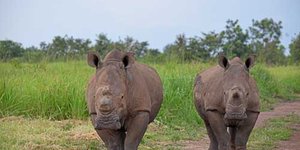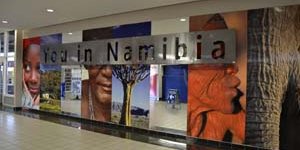Like this article?
Go on, give it a kudu!

Published on February 20 2014
Written by:
Fran
2249 views
When technology and wildlife giants team up, then you know you are looking at a force to be reckoned with. This is exactly what is playing out in Namibia, where the global conservation giant WWF, is using Google-funded technology to protect Africa’s dwindling rhino population. According to WWF, they’ve chosen Namibia to feature this latest anti-poaching project because Namibia has shown convincing commitment towards rhino protection, with a track record and rhino protection stories confirming their commitment.
We’ve seen the rhino population take a severe plunge. South Africa’s rhino killings reached an all-time high of 1,004 in 2013 - making 2013 the worst year ever for southern Africa’s rhino population What is particularly disheartening is to witness how one after the other anti-poaching measure just seems to be overhauled by internationally fueled poaching syndicates. But now, WWF is going high-tech in trying to combat the relentless fight against rhino poaching, and is bringing a new spark of hope through technology. Rhinos were tagged with radio-frequency identification (RFID) chips, and off the drones were sent.
Two national parks in Namibia, one being Etosha National Park, have Falcon UAVs drones patrolling the sky. These specialized radio-controlled drones are the rangers’ new ears and eyes, offering surveillance control during both day and night. Interestingly, these radio-controlled surveillance drones have been designed and developed in such a way that apart from launching by hand, they can be controlled by any Ipad or similar smart technology device. This is opening up an entire new sphere of anti-poaching control for Africa’s rangers.
The surveillance drones are fully equipped with the latest and most advance technological monitoring equipment, including high resolution cameras, sensors and RFID corresponding to RFID chipped wildlife. All of these are closely connected to communication systems, keeping staff constantly in the loop of rhino movement and potential presence of poachers, even in the hard to reach corners of the vast national parks. The drones send live footage material to rangers and communication staff, thus the entire park team is in constant communication when it comes to protecting the rhino herds.
The project also features several surveillance cameras stationed at strategic places throughout the parks. Surveillance cameras at waterholes allow dedicated staff to have their eyes on the ground of the entire park, day and night. It is believed that live footage from the surveillance cameras and drones will play a huge role in reducing poaching, particularly where poachers themselves are not equipped with or making use of advanced technological devices.
This advanced technology support project falls under WWF’s Wildlife Crime Technology Project – a groundbreaking project which showcases how technology and wildlife protection can be integrated. The project is also being undertaken in collaboration with Namibia’s Ministry of Environment and Tourism (MET). MET has long called for the support of technology and surveillance as part of anti-poaching initiatives. Seeing these being implied within two major Namibian parks is thus to their great satisfaction. Although subject to international funding, if the project proves that poaching can be drastically reduced by the help of advanced technology, then one can surely predict the ministry expanding and taking up similar projects in the near future. An added advantage is the tracking of wildlife movement, migration patterns and so forth. These surveillance drones may very well prove their pound’s worth in Africa’s last but not forgotten wilderness locations.
Photo credits: some rights reserved by Jason Wharam via flickr [Creative Commons]
Has been on: 11 safaris
Seeing beyond the average tourist routes and experiencing local life is my type of travel! Living in South Africa I'm an environmentalist at heart, and I continue to marvel at the beauty of the African continent.
© Your African Safari Ltd, All rights reserved.
Your African Safari is a safari-planning and safari review site. It was created to help support a healthy African wildlife population. All reviews are vetted before being approved and only ethical tours are published

Using charter flights on your next safari
Published on December 22 2025
By: yourafricansafari.com

Garamba National Park—an anchor of hope in the Democratic Republic of Congo
Published on January 09 2025
By: R.W.

Namibia imposes new visa requirements
Published on July 25 2024
By: yourafricansafari.com